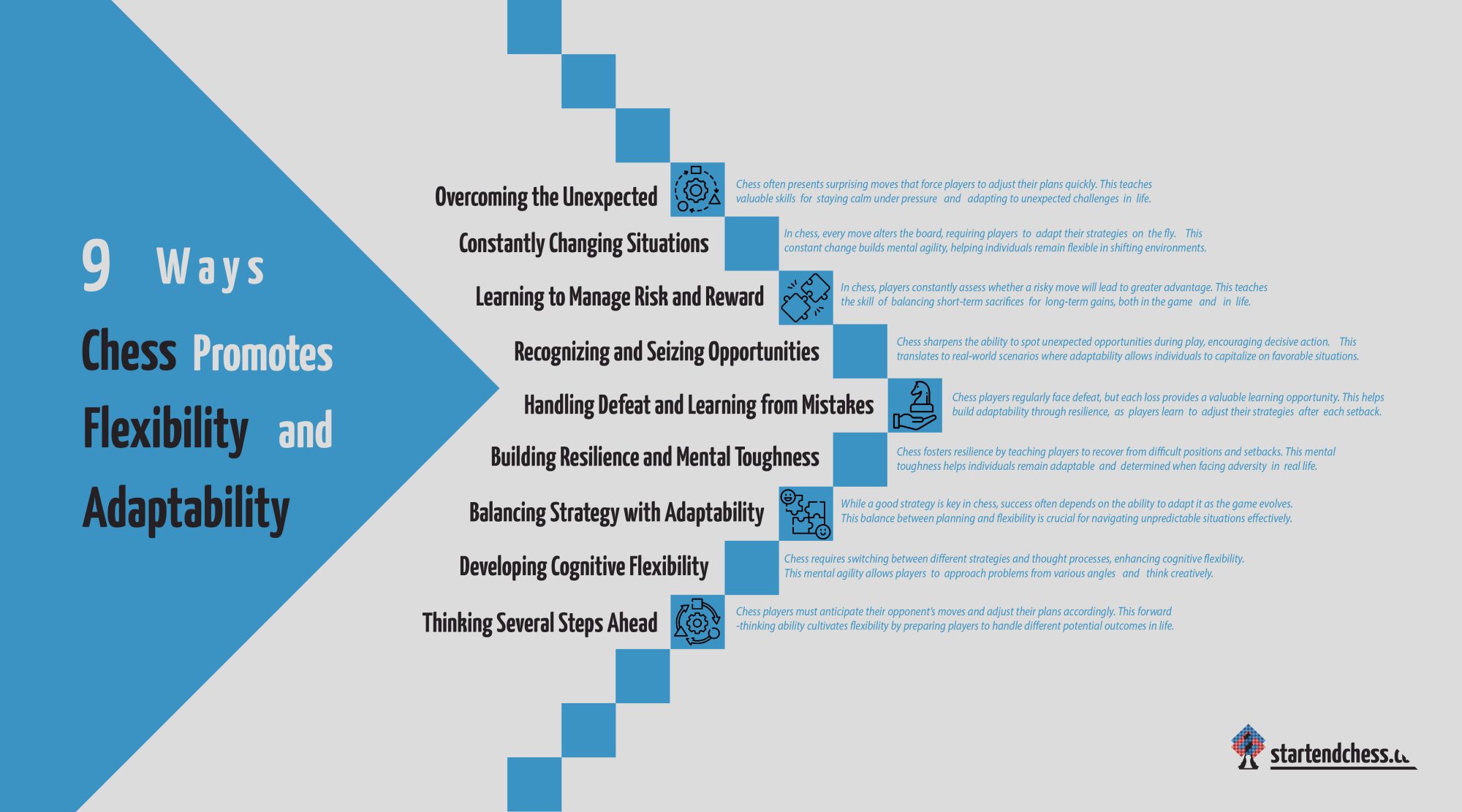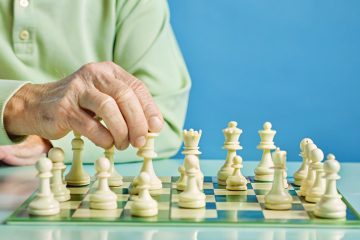9 Ways Chess Promotes Adaptability and Flexibility
In today’s fast-paced world, the ability to adapt quickly and think flexibly is more crucial than ever. Surprisingly, chess—a game centuries old—can be a powerful tool in developing these essential skills. Chess promotes adaptability by challenging players to think on their feet, adjust strategies, and handle unexpected challenges.
Through its ever-changing dynamics and the need for constant reevaluation, chess sharpens the mind, fostering a deeper sense of flexibility and cognitive agility. In this article, we will explore how chess promotes adaptability and flexibility, and how these skills can extend beyond the chessboard to enhance problem-solving abilities and resilience in both personal and professional life.

- Constantly Changing Situations
One of the significant ways chess teaches adaptability is through its ever-changing nature. In one instance, a player makes a move that changes the whole board of chess-and thus requires opponents to reassess their strategy. Chess is a dynamic activity, positions and threats and opportunities arriving and disappearing in a flash. Players must rise to the new situation, thinking on their feet and finding ways of modifying their approach to meet the new landscape.
Much like in chess, circumstances can change at any moment throughout life. It’s in developing the ability to be flexible and adapt one’s strategy based on changing conditions where success is often realized in almost all other areas of life, from work to relationships.
- Overcoming the Unexpected
No matter how well one has planned in chess, there are always surprises from the opponent that catch one off guard in the form of an unplanned move or a tactic. How one handles such surprises or recover from the prospective disrupting plays is the most valuable trait one should have with him while playing chess. Adaptability in chess means that one learns to keep cool under pressure, analyzes the new situation, and makes rapid readjustments.
In real life, adaptability is the most important thing in overcoming sudden happenings, whether at work, personal problems, or changes in the global environment. Chess develops abilities that thus train you for changes and make you sure in your powers of overcoming obstacles.
- Developing Cognitive Flexibility
Cognitive flexibility is the capacity of the brain to switch among different thoughts, strategies, or means of solving problems. In chess, it is an important capability since one constantly has to switch from attack to defense and vice versa, from short-term benefits to long-term plans-from using intuition to more logical ways of thinking. Working out cognitive flexibility allows chess players to look at issues from many different standpoints, which in turn makes them much more creative and flexible in their thinking.
The cognitive flexibility in real life is switching from one kind of task to another, adjusting to different ideas, and handling challenging situations with ease. Chess sharpens this ability by consistently presenting new problems that require fresh thinking.
- Learning to Manage Risk and Reward
Chess often demands making a trade-off between a move that places the player in a position of extreme risk for a reward. Often, the player has to be willing to sacrifice in order to reach an advanced strategic position further in the game. This gives a parallel real-life scenario of weighing up risk and reward in adapting to circumstances, such as whether to take a calculated risk in business or personal life.
The dynamically developed assessment of risk and reward in playing chess will make the player with the ability to adapt more easily with changes in decision-making. It is very important to be flexible in making an informed choice in an unstable situation.
- Recognizing and Seizing Opportunities
As in life, chess opportunities can arise anytime. A timely mistake of the opponent can give the player the opportunity to seize control. Chess teaches a player to be observant and take advantage of a chance given. This automatically requires readiness for quick changes of direction, refocusing, and rapid changes of plans.
Real life usually tends to pop up when it is least expected. Whether this be for a new career opening, networking, or learning something new, being adaptable means noticing those moments and having the flexibility to pivot when necessary.
- Handling Defeat and Learning from Mistakes
Of course, failure is a reality, just like in life. No matter how good one may be, there comes that one time when a chess player is defeated. But it is the ability to rise above those failures that matters. Playing chess teaches one to go over their moves where an error occurred and how it could have been handled better to bring about a different outcome during the game. The ability to do so brings resilience and openness to learning, allowing adaptability and flexibility in growth and continuous improvement.
The fact is, in life, one finds it necessary at times to bend with a situation when things just don’t happen as they’re supposed to. It’s not surprising, then, that some people never view failure as defeat, but rather as an opportunity to learn and try a different approach as they forge ahead with their quest even more determinedly.
- Thinking Several Steps Ahead
Good chess players know that success emanates from being able to think several moves in advance. It is such a forward-thinking mentality that allows the player not only to prepare for many different potential outcomes but also to adjust strategies based on what their opponents might or might not do. Anticipating different outcomes and the ways one might adapt to them is a hallmark of flexibility.
Likewise, in life, the ability to plan based on a number of contingencies and to carry out those plans as effectively as possible while remaining open to new information that might alter them is often one of the keys to success. The foresight provided by such planning allows the individual to be adaptable, to go with the flow, rather than at the mercy of circumstance.
- Balancing Strategy with Adaptability
Chess is a game of strategy, but such strategy cannot be concrete; it has to have some fluidity to it. A chess player who cannot flow with the direction of his opponent through slight adjustments in his moves can hardly be any good. Chess equips players with the ability to balance a powerful game plan with enough flexibility to make changes wherever necessary.
This balance is also crucial in daily life. Be it a long project, relations, or personal goals, being supple on top of being stuck to the overall strategy often reaps greater success. Flexibility lends one the option of changing course, if need be, while keeping their long-term goal in mind.
- Building Resilience and Mental Toughness
Adaptability is often associated with resilience, and chess builds both. It is in this respect that resilience gives way, through the mental toughness that has to cope with the intricacies of chess, recover from any mistake, and stay focused during pressure. Chess players know how to be flexible in those moments when everything in the game is going completely against them, with unwavering determination to find a creative way out for winning.
Life requires resilience and adaptability. Developing mental toughness through chess, one will be more capable of facing life’s ups and downs with much ease, getting back up to running after having gotten knocked off their feet, and being resilient in circumstances that would have their head hung down.

Practical Tips for Seniors: How Chess Promotes Adaptability and Flexibility in Everyday Life
Chess, more than a game, is a very good tool to help older adults acquire flexibility and adaptability in life. Skills that are gained through regular practice, such as strategic thinking, decision-making, and problem-solving, can be applied as more effective coping mechanisms for life problems. A few practical means older adults can apply skills learned through playing chess are presented below:
-
Decision-Making and Problem-Solving
In chess, a move is always well-thought-out and anticipated, similar to making a decision in real life. Forethought, option weighing, outcome forecasting, and adjustment of methods help to reinforce seniors’ boldness when making decisions regarding personal issues or finances. Through practice of this skill when playing chess, seniors are able to better prepare themselves for solving puzzles in daily life, from functioning within time limits to dealing with unexpected things. -
Mental Flexibility in Social Interactions
Chess also encourages flexibility in thinking as players react to evolving challenges during the course of the game. Similarly, seniors can apply the same flexibility to social interactions, gaining an understanding of how to adjust their approach based on the personality and needs of the other person. Whether navigating relationships with family members or adapting to new social environments, the ability to stay open and flexible fosters healthy communication and more meaningful relationships. -
Enhancing Memory and Focus
Chess promotes adaptability by testing memory and attention. Remembering past moves, predicting future outcomes, and keeping one’s mind on the game all require mental effort and focus. These same mental skills can be transferred to daily life, enabling older adults to improve their recall of memory, remain organized, and preserve attention to detail in tasks such as shopping, cooking, or following routines. -
Managing Stress and Patience
Patience is also acquired through playing chess since the game requires players to wait for the right time to make their move and plan the next one with the greatest caution. Seniors can then apply such methods in everyday life and reduce stress. Either when faced with a stressful situation or expecting an important decision, patience and calmness under pressure can mean more productive outcomes. -
Adapting to Technology
Chess websites offer a simple way for seniors to continue improving their game while adopting modern technology. Online chess app playing can introduce seniors to digital interfaces and improve their overall tech-savviness. This flexibility with technology can also make room for other activities, from social media use to online shopping or telemedicine doctor visits.
By integrating the skills learned through chess into daily life, seniors can improve their adaptability and flexibility, enriching their cognitive abilities and overall quality of life.
In conclusion, chess promotes adaptability and flexibility in ways that extend far beyond the game itself. The ability to adjust strategies, think quickly, and handle unexpected challenges is something that chess players develop with every move. As we’ve seen, chess promotes adaptability by teaching us to stay calm under pressure, reassess situations, and make rapid adjustments.
These skills are invaluable, whether you’re facing a tricky problem at work or adapting to changes in your personal life. Now that you know how chess promotes adaptability and flexibility, think about how you can apply these lessons to your own challenges. How has adaptability helped you in real life, and how might chess sharpen your ability to handle future obstacles? Share your thoughts!
We’ve prepared a podcast to accompany this article, offering the same insights in an audio format. If you enjoy listening, give it a play!
Recommended Articles:
- Why Chess for Seniors is a Great Activity: Unlocking Health and Cognitive Benefits
- 9 Effective Ways Chess Enhances Self-Discipline
- 8 Powerful Benefits of Chess for Improves Thinking Skills
- Chess and Cognitive Flexibility: Adaptability for the Adult Mind
- How Chess Can Sharpen Your Mind and Boost Cognitive Skills



0 Comments